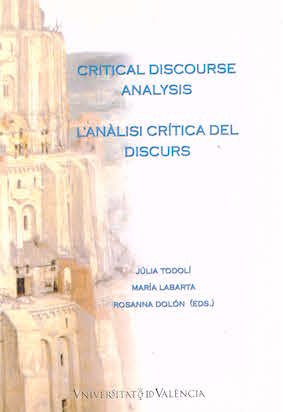Affordances for Empowerment: a pedagogical, analytical and heuristic tool for textual and discoursal uncloaking
DOI:
https://doi.org/10.7203/qfilologia.11.5047Paraules clau:
Anàlisi Crítica del Discurs, Literacitat Crítica, naturalització Resum
Resum
L’article presenta una eina pedagògica, analítica i heurística per a l’anàlisi crítica de textos i discursos, dins el marc anomenat Critical Literacy . Aquest marc es fonamenta en una orientació socioconstructivista del llenguatge i en les perspectives teòriques de l’Anàlisi Crítica del Discurs i la Literacitat Crítica. La intenció de l’article és oferir als professors una eina docent per a usar amb els estudiants en diferents classes (anglés, estudis dels mitjans la comunicació, la literacitat, etc.) a fi d’alertar-los i conscienciar-los de les maneres, molt sovint opaques, amb què els individus construeixen, entenen i representen la realitat a través del llenguatge. Es té en compte el potencial analític d’un marc teòric com aquest i es presenten recomanacions sobre la seves aplicacions pedagògiques.
 Descàrregues
Descàrregues
Descàrregues
Publicades
Com citar
-
Resum282
-
PDF (Español)139
Número
Secció
Llicència
 Este obra está bajo una licencia de Creative Commons Reconocimiento-NoComercial-SinObraDerivada 4.0 Internacional.
Este obra está bajo una licencia de Creative Commons Reconocimiento-NoComercial-SinObraDerivada 4.0 Internacional.
Tots els documents inclosos a OJS són d'accés lliure i propietat dels seus autors i/o institucions editores, i per tant, qualsevol acte de reproducció, comercialització, comunicació pública o transformació total o parcial necessita el consentiment exprés i escrit d'aquests.
Authors who publish with this journal agree to the following terms:
- Authors retain copyright and grant the journal right of first publication with the work simultaneously licensed under a Creative Commons Attribution License that allows others to share the work with an acknowledgement of the work's authorship and initial publication in this journal.
- Authors are able to enter into separate, additional contractual arrangements for the non-exclusive distribution of the journal's published version of the work (e.g., post it to an institutional repository or publish it in a book), with an acknowledgement of its initial publication in this journal.
- Authors are permitted and encouraged to post their work online (e.g., in institutional repositories or on their website) prior to and during the submission process, as it can lead to productive exchanges, as well as earlier and greater citation of published work (See The Effect of Open Access).




